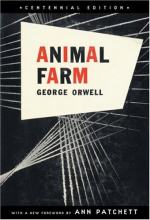|
|
Animal Farm Author/Context
George Orwell was the pen name of Eric Arthur Blair, born on June 25, 1903, in Motihari, India, to British parents. The family moved to England from India when Orwell was very young. He was educated at a succession of boarding schools and after school, applied to join the British Imperial Police and was stationed in Burma. He disliked police work and disapproved of the cruelties of the imperial system. After five years he resigned his commission.
Orwell decided he wanted to write and lived in rooms in London and Paris over the next few years. His first professional articles were published in 1928 - for the rest of his life he continued a flourishing career writing articles and reviews. He was a hard, conscientious worker and produced an almost unbelievable volume of output.
His first novel, Down and Out in Paris and London, was published in 1933, after which he steadily continued to write and publish novels. He married Eileen O'Shaughnessy on June 9, 1936.
Orwell was very upset over the threat that he felt Fascism posed to liberty in Europe and when the Spanish Civil War broke out, he went to Spain to fight against the fascists. On his return to England, Orwell wrote Homage to Catalonia, based on his war experiences. His next book was Animal Farm, published in 1945, which became his first major success. He and Eileen adopted a baby boy, Richard, in 1943. On March 29, 1945, Eileen died of cardiac arrest during an operation, leaving Orwell devastated. He retired to a remote island, along with Richard and a housekeeper/nanny. Here he wrote his final masterpiece, 1984.
He was married again, to Sonia Brownell, on October 13, 1949. He died of advanced tuberculosis on January 21, 1950.
There is little doubt that Orwell's description of Animal Farm is a satire based on events in Russia after the October 1917 revolution. In Russia, workers seized power from the traditional monarchy. The first major leader, V.I. Lenin, developed the ideas of Communism from the writings of Karl Marx, Friedrich Engels and others - the basic principle was one of equality and government by the common people.
After Lenin's death in 1924, two Communist Party leaders, Stalin and Trotsky, vied for power, and Stalin eventually won when Trotsky was expelled from the Party in 1927 and later deported. In 1934 Stalin began 'purges' in which he conducted mass executions of individuals whom he viewed as enemies of the State. In 1941 Stalin named himself head of the supposedly collective government, able to 'get away' with this because the country was preoccupied with foreign affairs and the complex happenings of World War 2, in which Stalin sided first with the Axis, then with the Allied powers.
Rationing was enforced during most of Stalin's rule, with minimum labor requirements for all. The Communist Party members were generally recognized as being much better off than the average citizen during Communist Party rule.
Bibliography
Shelden, Michael. Orwell: The Authorized Biography. New York, NY: HarperCollins, 1991.
MacKenzie, David. A History of Russia and the Soviet Union. Homewood, Ill.: Dorsey Press, 1977.




